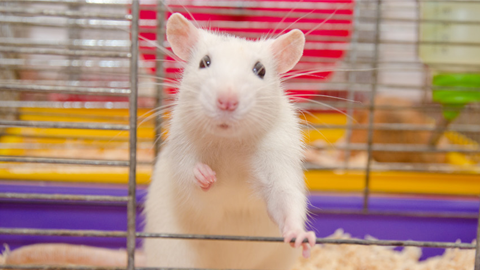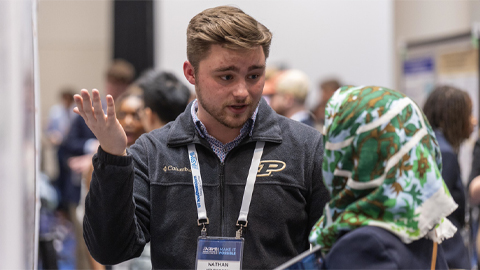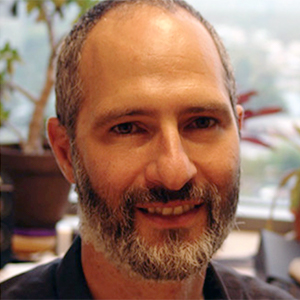Of mice and scientists
When I was a 22-year-old graduate student, I was instructed to add dry ice to a cage containing a white lab mouse and to wait until the carbon dioxide released from the dry ice purged the oxygen from the cage air and the mouse died. I had been taught to follow instructions, and I did as I had been taught.
 |
I asphyxiated two mice that day. I used an oven mitt to protect my hand from the cold of the dry ice pellets. I first weighed the pellets to ensure they would provide enough carbon dioxide to kill each mouse. Then I lifted the plastic lid on the top of the cage and poured the dry ice into a metal container with warm water in it. The warm water made the dry ice bubble rapidly and hastened the release of carbon dioxide gas from the pellets. I quickly closed the lid. Then I waited anxiously and uncomfortably. Within minutes, each mouse lay down and stopped moving. After a further minute, my mentor checked that they were dead. Later that day, I harvested organs and analyzed the levels of a few proteins, though the purpose and details of those experiments have long since departed from my memory. I do vividly remember how I felt as I sacrificed the mice. I felt a tightness in my stomach, as if I were about to vomit, and a frightening sense of power — imagine Voldemort with severe food poisoning.
I also felt something that I did not appreciate at the time — comfort and trust in following instructions. Experienced scientists had developed these instructions, so it was okay to follow them. This trust and comfort were so strong that they overwhelmed my uncertainty about my actions. I did not consider the possibility of asking if what I was doing was okay or, even further, if it was sensible. I did not value my own concerns and ideas.
Why didn’t I value my own ideas? It was a habit from my childhood, formed for good reason — it helped me to feel worthwhile. Following instructions made my parents happy, and it also made my teachers happy, which in turn gave me a sense of accomplishment and meaning and was a large factor in my decision to study science. Following instructions felt like eating ice cream on a warm day — it was satisfying and filled me with joy.
Some 20 years later, I am a professor who teaches and mentors students. I wonder about what and how I should be teaching them. I wonder about the value of following instructions and how this can be both a critical part of science and at the same time an impediment to free thought, creativity and ethics. I am convinced that both instruction following and free thought have an important role in education. As a scientific community, we already are adept at teaching the value of following instructions.
I feel an urgent need to encourage free thinking in the early stages of science education. Devaluing personal concerns and ideas is common among graduate students in the sciences. As an educator, I seek opportunities for students to share their ideas and gain confidence and a sense of value in their perspectives.
I have tried many unsuccessful approaches. For example, in the midst of explaining a 20-step experiment, I would ask young scientists to consider why a step was important. This type of questioning drove me nuts when I was a student because it took all my energy to take in new instructions, leaving me unable to think freely or clearly. Asking such questions as a professor also drove me nuts. If a student struggled to answer, I would wonder if they felt like a failure. My attempts to foster free thinking felt inefficient or counterproductive.
In my search for more effective ways to foster confidence and creative thinking, I stumbled on ethics. During casual conversations with students and postdocs, I often would search for topics of mutual interest. What topics bring out broad interest from scientists independent of their status from student to leader? Ethical questions are the best answer I’ve found, and the conversations they engender can stimulate creativity and confidence. Discussions of ethical questions provide a proverbial roundtable where the perspectives of all scientists can carry equal weight: When is it appropriate to sacrifice animals in research? When is it acceptable to genetically engineer plants, animals and humans? Is it sensible for humans to design robots to kill? What human population control measures, if any, are appropriate? These discussions provide opportunities to practice free thinking and open communication while learning to value our own ideas and wisdom.
Is there a tradeoff between following instructions and creativity in research training? Maybe there is, and encouraging free thinking will come with a cost. My experience indicates that the cost is minor compared to the benefits.
So, when is it appropriate to sacrifice mice for science?
I cannot answer that question for you, but I hope my thoughts may help you to consider and value your own perspective and encourage others to do the same.
Enjoy reading ASBMB Today?
Become a member to receive the print edition four times a year and the digital edition monthly.
Learn moreGet the latest from ASBMB Today
Enter your email address, and we’ll send you a weekly email with recent articles, interviews and more.
Latest in Opinions
Opinions highlights or most popular articles

AI can be an asset, ASBMB educators say
Pedagogy experts share how they use artificial intelligence to save time, increase accessibility and prepare students for a changing world.

Sketching, scribbling and scicomm
Graduate student Ari Paiz describes how her love of science and art blend to make her an effective science communicator.

Embrace your neurodivergence and flourish in college
This guide offers practical advice on setting yourself up for success — learn how to leverage campus resources, work with professors and embrace your strengths.

Survival tools for a neurodivergent brain in academia
Working in academia is hard, and being neurodivergent makes it harder. Here are a few tools that may help, from a Ph.D. student with ADHD.

Hidden strengths of an autistic scientist
Navigating the world of scientific research as an autistic scientist comes with unique challenges —microaggressions, communication hurdles and the constant pressure to conform to social norms, postbaccalaureate student Taylor Stolberg writes.

Black excellence in biotech: Shaping the future of an industry
This Black History Month, we highlight the impact of DEI initiatives, trailblazing scientists and industry leaders working to create a more inclusive and scientific community. Discover how you can be part of the movement.

